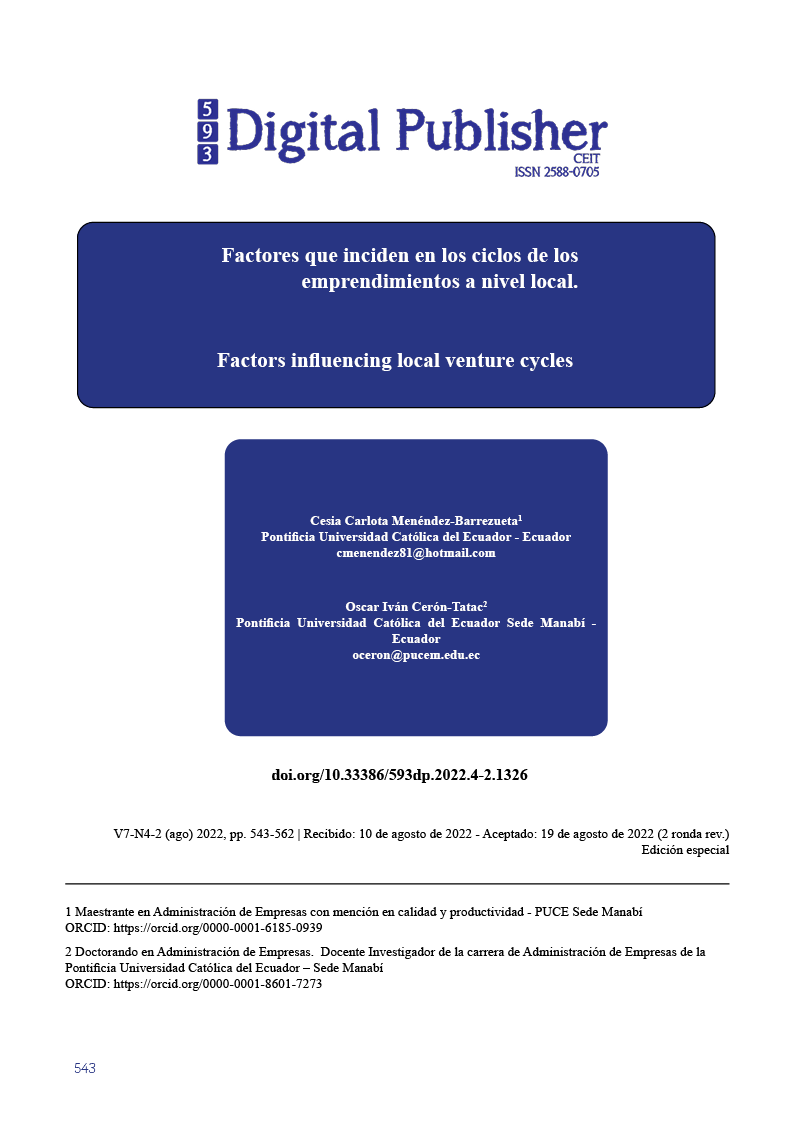Factors influencing local venture cycles.
Main Article Content
Abstract
Entrepreneurial activity in Ecuador has stood out notoriously in recent years, both in urban and rural areas, carried out by men and women of different ages and academic backgrounds, in various productive sectors; which denotes the contribution to the socioeconomic development of local entrepreneurship.
In this context, the objective of the study consisted of analyzing the factors that influence the cycles of Ecuadorian entrepreneurship, based on the documentary review of the report of the Global Entrepreneurship Monitor 2020 survey and the application of the interview to local entrepreneurial experts; having as results the identification of 9 factors in the literature review such as: financing for entrepreneurs; government policies; government programs; education in entrepreneurship; transfer of research and development; commercial and legal infrastructure; internal market; physical infrastructure and social and cultural norms; as well as the factors of motivation, professional advice, the ability to adapt, the business idea; the ecosystem in which it is developed; innovation capacity; human capital; initial investment; financial muscle; marketing and product positioning.
It is concluded that there are several factors that influence the phases of entrepreneurship, being very important the ability to adapt or entrepreneurial resilience, which arises when the venture has been launched and the ups and downs that require immediate action to keep the business operational begin to appear.
Key words: entrepreneurial activity, entrepreneurship ecosystem, entrepreneur, motivation, innovation.
Downloads
Article Details

This work is licensed under a Creative Commons Attribution-NonCommercial-ShareAlike 4.0 International License.
1. Derechos de autor
Las obras que se publican en 593 Digital Publisher CEIT están sujetas a los siguientes términos:
1.1. 593 Digital Publisher CEIT, conserva los derechos patrimoniales (copyright) de las obras publicadas, favorece y permite la reutilización de las mismas bajo la licencia Licencia Creative Commons 4.0 de Reconocimiento-NoComercial-CompartirIgual 4.0, por lo cual se pueden copiar, usar, difundir, transmitir y exponer públicamente, siempre que:
1.1.a. Se cite la autoría y fuente original de su publicación (revista, editorial, URL).
1.1.b. No se usen para fines comerciales u onerosos.
1.1.c. Se mencione la existencia y especificaciones de esta licencia de uso.
References
Alonso, C. (2011). El emprendedor Schumpeteriano: aportes a la teoría económica moderna. Revista de Administración, Finanzas y Economía, 5(1), 1-22. https://econpapers.repec.org/article/egarafega/201101.htm
Alonso, C., & Fracchia, E. (2009). El emprendedor Schumpeteriano. Aportes a la teoría económica moderna. Buenos Aires: Anales | Asociacion Argentina de Economia Politica.
Arteaga, E. (2013). Los clásicos. Joseph Schumpeter y su influencia en la economía del cambio tecnológico. Debate Económico, 2 (2), 142-161. https://biblat.unam.mx/hevila/DebateeconomicoMexicoDF/2013/vol2/no5/7.pdf
Bazdresch, C., & Meza, L. (2010). La tecnología y la innovación como motores del crecimiento en México. México: FCE. México.
Campuzano, J., & Cedillo, L. (2019). Emprendimiento dinámico, crecimiento económico y política pública en el Ecuador. INNOVA Research Journal, 4 (3.1.), 42-54. https://doi.org/10.33890/innova.v4.n3.1.2019.1076
Carrasco, I., & Castano, M. (2008). El emprendedor Schumpeteriano y el contexto social. ICE, 845, 121-134. https://dialnet.unirioja.es/servlet/articulo?codigo=2782673
Castillo, A. (2009). “Emprendedores como Creadores de riquza y desarrollo regional. Estado del Arte en la ensenanza del emprendimiento. Santiago de Chile: First Public Inc Chile S.A,. http://recursos.ccb.org.co/bogotaemprende/portalninos/contenido/doc2estadodelarteenlaensenanzadelemprendimiento.pdf
Formichella, M. (2004). El concepto de emprendimiento y su relación con la educación, el empleo y el desarrollo local. Buenos Aires, Argentina: INTA.
Fuentelsaz, L., & González, C. (2015). El fracaso emprendedor a través de las instituciones y la calidad del emprendimiento. Universia Business Review, 64-81. https://ubr.universia.net/article/view/1527
Gámez, J. (2008). El emprendedor, hacia una nueva caracterización en Colombia. Management. Revista de la Facultad de Ciencias Empresariales, XVII(29), 17-32.
González, M. (2011). Joseph Alois Schumpeter (1883-1950): una semblanza. eXtoikos, 1(1), 83-88. http://www.extoikos.es/pdf/n1/schum.pdf
Goss, D. (2005). Schumpeter’s Legacy? Interaction and Emotions in the Sociology of Entrepreneurship. Entreprenership Theory and Practice, 29 (2), 205-219. Obtenido de https://journals.sagepub.com/doi/abs/10.1111/j.1540-6520.2005.00077.x
Groenewegen, P. (2003). Classics and Moderns in Economics. Vol. II: Essays on Nineteenth- and Twentieth-Century Economic Thought. New York: Routledge.
Herrera, C., & Montoya, L. (2013). El emprendedor: una aproximación a su definición y caracterización. Punto de vista, 4(7), 7-30. https://doi.org/10.15765/pdv.v4i7.441
Jeannot, F. (2002). Fluctuaciones cíclicas en Schumpeter. Análisis Económico, XVII, 43-77. http://www.analisiseconomico.com.mx/pdf/3503.pdf
Lasio, V., Amaya, A., Zambrano, J., & Ordenana, X. (2020). Global Entrepeneurship Monitor . Guayaquil: ESPAE-ESPOL. https://www.espae.edu.ec/wp-content/uploads/2021/02/GEM_Ecuador_2019.pdf
Merchán, M. (2022). Análisis del emprendimiento exportador ecuatoriano con enfoque de género en el anio 2019. Quito: Tesis de maestría. Escuela Superior Politécnica del Ejército.
Nueno. (2009). Emprendiendo hacia el 2020: una renovada perspectiva global del arte de crear empresas y sus artistas. Espana: Deusto.
Paola Carolina Aulestia, F. d. (1 de julio de 2022). Los emprendimientos, sus ciclos y factores. (C. Menéndez, Entrevistador)
Portilla, H. (2010). Emprendimiento. Basado en la obra de Joseph Alois Schumpeter. Bogotá: Tesis de maestría. Universidad De Lasalle.
Rivera, C. (1 de julio de 2022). Los emprendimientos, sus ciclos y factores. (C. Menéndez, Entrevistador)
Rodríguez, C., & Jiménez, M. (2005). Emprenderismo, acción gubernamental y academia. Revisión de la literatura. Innovar, 15(26), 73-89.
Rodríguez, j. (2 de julio de 2022). Los emprendimientos, sus ciclos y factores. (C. Menéndez, Entrevistador)
Sparano, H. (2014). Emprendimiento en América Latina y su impacto en la gestión de proyectos. Revista Dimensión Empresarial, 12(2), 95-106. http://www.scielo.org.co/pdf/diem/v12n2/v12n2a08.pdf
Stevenson, H., & Jarillo, J. (1990). A Paradigm of Entrepreneurship: Entrepreneurial Management. Strategic Management Journal, 11, 17-27.
Valdaliso, J., & López, S. (2000). Historia económica de la empresa. Barcelona: Crítica.
Varela, R. (2001). Innovación empresarial: arte y ciencia en la creación de empresas. Bogotá, Colombia: Pearson educación.



